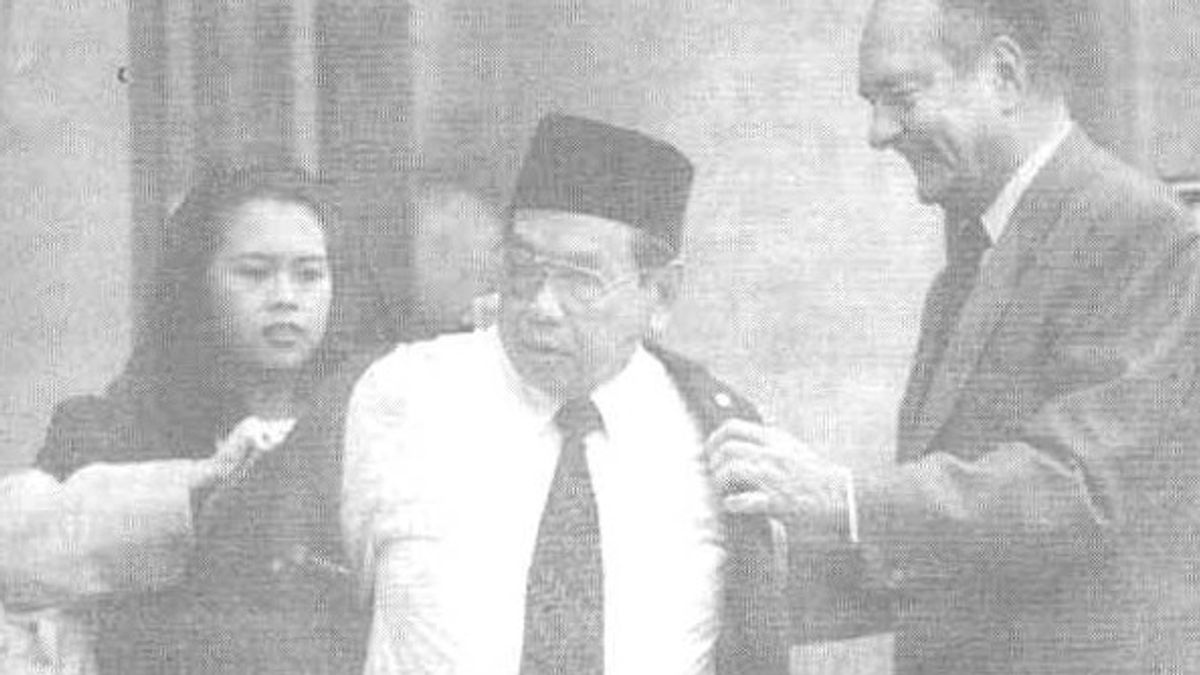JAKARTA - Abdurrahman Wahid or Gus Dur is a figure of a million charms. As the son of a kiai, Gus Dur's life was not only spent studying religion but also deepening culture. The world of film is one of the mediums. He enjoys watching movies, from Russian to French films.
For him, films are like windows of knowledge. There are also many lessons learned from the film, especially related to humanity. Gus Dur is an accomplished film critic. He has also been a movie star. Since childhood, Gus Dur was considered an intelligent child. He can digest well all forms of lessons in school. Gus Dur tends not to need to study as hard as his peers.
The blessing gave Gus Dur a lot of free time. The owner of the chatter "That's just how troublesome!" So he has a lot of time to do his hobby: reading and watching movies. His two hobbies further solidified Gus Dur's view that science does not only exist in schools. Science can be learned from anywhere, including through films.
Gus Dur's love for films grew when he continued his education in Yogyakarta. He began to explore the film seriously. In fact, most of his time in Student City is spent watching movies. For the sake of watching a movie, Gus Dur was willing to ride his bicycle to the cinema which is four kilometers away.
This hobby is unusual for a kiai's son who grew up among traditionalists. However, there is nothing taboo about films in Gus Dur's eyes. Everything was broken down. “Because of that, he tried to do a tactic that unfortunately is very easy to guess. When his friends watched him call out to him from outside his room at Kiai Junaidi's house, it was agreed that they should speak loudly about the delay in attending the meeting of Ansor, the youth wing of Nahdlatul Ulama (NU)."
“Although Gus Dur later developed a serious appreciation for films, at this stage he is watching anything that can be seen in Yogyakarta. However, as a teenager who really loves films, Gus Dur's appreciation of films is much more serious than that shown by most of his peers," said Greg Burton in the book Biography of Gus Dur (2011).

In fact, Gus Dur's passion for watching films continued to carry over to Cairo, Egypt. At that time, Gus Dur who studied at Al-Azhar University seemed to have a new freedom. He no longer needs to make all sorts of tactics to watch movies, like in the past in Indonesia. In Cairo, Gus Dur prefers to learn a lot outside the classroom, rather than in the classroom.
Gus Dur realized that almost all of the subjects taught at Al-Azhar had been studied at Islamic boarding schools in remote parts of the country. The campus space is considered not too challenging. The study room that became Gus Dur's favorite in Cairo turned from a classroom into the library of the American Embassy in Egypt and a cinema.
He then loved all forms of film, no matter where it came from. He likes Russian, Eastern European and of course French films. Gus Dur often devoured two to three films a day. Especially French films. Gus Dur really liked the film from the Fashion Country. French films are seen as having honest storytelling and cinematography patterns in revealing the distinctive side of humanity. Some of them such as hatred, sex, to cunning.
“I got a story from Gus Mus (Mustofa Bisri) about Gus Dur's hobbies reading books, comics, and watching movies while studying at al-Azhar University, Cairo, Egypt. Gus Dur rarely attends college. Because he had studied all the subjects there when he was at the Islamic boarding school.”
“Therefore, he mostly visited the United States Embassy Library in Cairo. There, he acquired a wealth of knowledge, and he enjoyed it very much. When night falls, Gus Dur goes to Atabah or Tahrir Square to watch a movie,” wrote Husein Muhammad in Gus Dur's book Samudra Kezuhudan (2009).
Gus Dur plays a film and becomes a judge at the Indonesian Film Festival
Gus Dur was the chairman of the jury for the highest award for Indonesian films, the Indonesian Film Festival (FFI) in 1985. In the award event, Gus Dur had the capacity as Chairman of the Jakarta Arts Council (DKJ). The election of Gus Dur as a jury then raised the pros and cons of NU circles.
“A few months later, a gap arose between Kiai As'ad and Gus Dur. Why? Because Gus Dur was considered eccentric and considered 'out' of NU's traditional values. For example, Gus Dur gave a lecture at the Indonesian Church Association (PGI) session which was considered to expose the weaknesses of Muslims; assalamu 'alaikum can be replaced good morning, and become one of the FFI judges, “said Syamsul A. Hasan in the book Kharisma Kiai A'sad in the Eyes of the Ummah (2003).
However, Gus Dur did not bother. He continues to appear "weird" and make surprises. Gus Dur is also known to be active in the study of literature, film, and culture in the capital city of Jakarta. For this reason, every visit to Islamic boarding schools, issues of literature, film, and culture are often the main reviews. Including when he wrote in the national mass media. His analysis of the film is sharp and likable.
His "eccentric" movement made Gus Dur a rare leader like no other. He is special. The privilege was also raised when Gus Dur became the number one person in Indonesia. Gus Dur took part in the main role in the documentary film titled High Noon in Jakarta (2001).
The film by director Curtis Levy and its editor Stewart Young narrates the story of Gus Dur's bravery against bandit politicians. The cultivation was carried out when Gus Dur served as the fourth President of the Republic of Indonesia (1999-2001).
“Then on the screen, a text reads High Noon in Jakarta. Does the text have anything to do with a 1950s Hollywood cowboy film called High Noon? The film tells the story of a law enforcement and security sheriff in a small town in the United States last century, played by actor Gery Cooper accompanied by actress Grace Kelly who plays his wife. The sheriff was not afraid to face his opponents. He waited for them to have a gun duel. It turns out that Gus Dura mat liked the film High Noon," wrote Rosihan Anwar in the book "Petite Histoire" Indonesia's Little History Volume 1 (2004).
The course of the film High Noon in Jakarta does have similarities. The film tells a lot about the political upheaval in Jakarta. At that time, Gus Dur faced attacks from all sides, from the DPR to the elite of political parties. However, Gus Dur stood as a brave and tough leader. He's like a sheriff in High Noon.
He proved himself to be a true statesman. As a result, the film strengthened the image of Gus Dur as a true film lover. Therefore, Gus Dur's involvement in the film world was complete. He can be transformed into an audience, critics, and film players. To commemorate his involvement in the film High Noon in Jakarta, here are the famous quotes that the audience remembers the most:
"The first president is crazy for women, the second president is crazy for money, the third president is really crazy, the fourth president is driving everyone crazy."
The English, Chinese, Japanese, Arabic, and French versions are automatically generated by the AI. So there may still be inaccuracies in translating, please always see Indonesian as our main language. (system supported by DigitalSiber.id)









